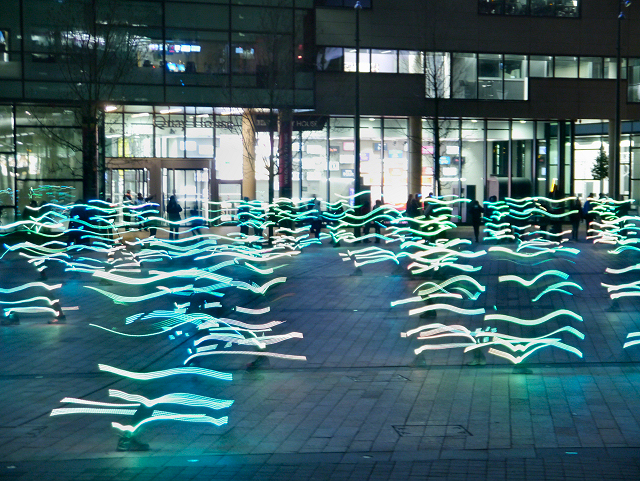
The clock seems to tick faster, we are able to do things in less time, but we constantly feel like we have too little time. In all times, art offers people a way of expressing their emotions, and so do many young poets in Quebec, Canada. In this interview Julia explores how the fast pace of society is reflected in poetry.
The clock seems to tick faster, we are able to do things in less time, but we constantly feel like we have too little time. In all times, art offers people a way of expressing their emotions, and so do many young poets in Quebec, Canada. In this interview Julia explores how the fast pace of society is reflected in poetry.

The alarm rings. You jump out of bed before it can ring a second time, throw on runners. Glass of orange juice in the kitchen and go! You check the news while running. Rush into the shower, make breakfast and read emails at the same time. Hurry to work, almost getting hit by a car on the way due to inattention. Arriving at work slightly sweating, the shower proven not to have really been worth it. Spending all day in meetings, grabbing lunch with a business partner whilst talking about current developments on the stock market. Try to make a good impression, even though eating this lunch in a minute of silence would be much more enjoyable. Leave work late, with the unsatisfied feeling of not having reached the daily goals, again. Work is piling up. Run to the gym, from there to the supermarket, decide for a microwave dish because of lack of time to cook. Run back home, boyfriend is waiting. Feels more like a duty to see him today, the editorial deadline at midnight still needs finishing. Fall asleep without having said more than three sentences to each other.
Can you recognize this lifestyle? We live in more and more speed up times, between smartphone, laptop screen and social media. Jana Nürnberger, my much loved sister, is writing her PhD on a topic that is closely related to the theme of sped up time and acceleration. Her topic ‘Le fugitif dans la poésie francophone actuelle (1979- 2014)’, deals with a phenomenon in contemporary French poetry that reflects the acceleration of different areas of life. During her research, she lived in Montréal for several years due to the high number of young poets living and working there. She is currently finalizing her work and will defend it in April. In this interview, she tells me a bit more about what ‘the fugitive’ actually is, how it is represented in the literature and how it impacts us as human beings.
“Speed is a normative force, as can be seen in nuclear disasters”
The fugitive is a term used in literature. What exactly does it mean?
‘Since I research the topic in German and French, I know that the meaning of the term fugitive differs per language. I am particularly referring to the German meaning of the word “Beschleunigung” now, it is very likely that in English it differs. If you look up the term fugitive in the dictionary, you will find that it has several meanings: “being on the run (escaped)”, or “briefly lasting (because it ends, or changes its nature)”, “fast (speed)” or “superficial, roughly sketched”.
I research the fugitive in the literary studies. But the concept has been important in philosophy since the antiquity. Here it represents the opposite of the eternal – the transitory. The eternal is always seen as worth striving for, while the fugitive is more negative. Not until the modern age did the fugitive became more appreciated and uprated in the art scene. Now, transient beauty, not only what last is beautiful. This is also why sketches are nowadays recognized as complete artworks.’
What are the topics that are discussed most often when talking about ‘speeding up’? What areas of life are most concerned with the heightened speed that we live on?
‘When talking about “acceleration (speeding up)”, Hartmut Rosa, a sociologist that researches the topic, says that there are three types of acceleration: the technical acceleration that makes it possible to move always at a faster speed, the acceleration of changes in society and the acceleration or the speed of life. This last one is reflected in our lifestyle, the way we are constantly rushing from A to B, checking our emails nonstop and jetting from one city to another in just a day. According to Rosa, acceleration is a societal principle of the modern age. People strive to achieve more and more. They live in the performance-oriented time of capitalism and pressure for economic growth. Time is a valuable good. It is almost a paradox: While we should have more time because of all the time-saving technological inventions, we constantly have the feeling that we are lacking time. The consequences, so Rosa, are devastating: speed is a normative force, as can be seen in nuclear disasters. Politics and other institutions can’t keep up, and therefore can’t counter global challenges of our times. This, according to Rosa, goes hand in hand with increased possibilities. Our attempts to use all of these possibilities at the same time, is what stresses. And sometimes it even leads to burnout, and depressions.
In Rosa’s monography The Acceleration, he mainly shows the negative societal consequences of acceleration. Armen Avanessian, a philosopher who taught among others at Yale, has another perspective on the acceleration paradigm. The technological innovations that allow for increased speed, make our lives a lot easier, but because we don’t have any positive future perspectives anymore and tend to look back to the past, we can’t fully profit from these possibilities. More recent work of Rosa also develops in this direction, towards the positive aspects of increased speed. In this new work Resonance he moves away from emphasizing the necessity of deceleration, and instead presents Resonance as the solution for acceleration. Coming from music, resonance helps us to be in tune with ourselves and the world again. This concept of Rosa is very controversial, since it is so metaphorical.’
“People strive to achieve more and more, and live in performance-oriented times”
What do you reckon causes the high speed in society?
‘Its origin lies in the 19th century, in the times of industrialization. Later, it is carried on by the mediatisation. Technological progress allows us to virtually travel the world at any moment. These technological developments, together with the societal and economic changes that are caused by them, lead us to live in times where acceleration is a given, a form of existence.’
How does the high speed impact us?
‘We feel that the world and its developments are always one step ahead of us, we can’t keep up with these complex developments and we feel like we can’t understand the world anymore. This causes us to look back a lot, because the present is too confusing. Since humans seem to always look for simple answers, they spend a lot of time looking back in the past rather than live in the moment. This is generally reflected and observable in many areas of life.’
Are people melancholic when thinking about the rapidly passing time?
‘In the cultural history, this phenomenon is indeed always accompanied by melancholy. The melancholy is expressed differently in different instances though, at the moment mostly through depression, but also with a form of melancholy that reminds of baroque times, since we can’t stop the time from passing. On the other hand the fugitive can also be fascinating and for the short moment it appears, it can cause enthusiasm and happiness. So it is very ambiguous. Think of a snowflake landing on the windowsill and melting soon after: a brief moment of happiness, often followed by melancholy.
Interestingly, in Japanese and Chinese philosophy melancholy is felt differently than in our culture that is dominated by Christianity. While we think that life necessarily runs from A to B, with B being our inevitable death, demonstrating our finitude, Japanese and Chinese philosophers believe that everything is in constant transformation. In contrast to our more individualistic vision, they focus less on the individual person and more on the big total picture: People are part of the cosmos, and when a life ends, something else continues to live on. Today Westerners try to use that Eastern philosophy as a guideline to demonstrate another way of dealing with the Beschleunigung and finitude.’
Is there a way to protect ourselves from the negative impact of acceleration?
‘Acceleration is primarily seen as something bad when talk-ing about the increase of living speed. To prevent that, we could try to and include more methods of deceleration in our daily life, such as methods of mindfulness: Conscious attempts to escape the speed. On a societal level that is a lot more difficult, and of course that then reflects on us as individuals, too. Therefore the best way is maybe – instead of waiting for societal interventions of deceleration – try and see the positives of acceleration like Avanessian. Acceleration can offer us challenges and possibilities, and we should learn to embrace these. As a society we can also prepare ourselves, for example by preparing pupils and students for the digitalisation.’
“The fugitive can also be fascinating and cause enthusiasm and happiness”
How is the fugitive reflected in poetry?
‘That is a very broad field. I research the contemporary poetry of one specific cultural environment, Quebec, and therefore in French. In the poems I read, I realized that acceleration is treated as a societal principle. The authors or personas speaking in the poems criticize liberalism and its impacts, for example the destruction of the environment. I also notice a strong awareness of finitude: Our world ends, because it went down the wrong path.
Fast vehicles also appear in the poems, but more as part of the scene, but at this point they are just an integral part of our daily lifes, so it is not really their speed that brings them into the poems. What really catches one’s eye though, is the way drones repetitively come up in the poems. Drones are really scary, because they are unmanned and the person that steers them can be far away. In war the distance to the proceedings might inure the person steering the drone and make him or her be less likely to do horrible things. That scares people.
I research how the fugitive is represented in poetry, and also how the poetry we read causes a feeling of brevity in us. One author I read, for example, jumps frequently from topic to topic. Her poems are fragmented, and the reader cannot immediately understand them. It seems like the sense withdraws itself from us and we can’t follow it. This is nothing that is written down, but something the poem does to us as readers. We call that a performative writing style. Poems show a moment in time. While time seems to pass too quickly in general, it manages to isolate and light up a specific moment.’ <<
References
– [Image 1] Retrieved at December 14, 2018 from https://s0.geograph.org.uk/geophotos/03/38/16/3381679_e1883a85.jpg/.
– [Image 2] Retrieved at December 17, 2018 from https://pxhere.com/en/photo/35194/.
The alarm rings. You jump out of bed before it can ring a second time, throw on runners. Glass of orange juice in the kitchen and go! You check the news while running. Rush into the shower, make breakfast and read emails at the same time. Hurry to work, almost getting hit by a car on the way due to inattention. Arriving at work slightly sweating, the shower proven not to have really been worth it. Spending all day in meetings, grabbing lunch with a business partner whilst talking about current developments on the stock market. Try to make a good impression, even though eating this lunch in a minute of silence would be much more enjoyable. Leave work late, with the unsatisfied feeling of not having reached the daily goals, again. Work is piling up. Run to the gym, from there to the supermarket, decide for a microwave dish because of lack of time to cook. Run back home, boyfriend is waiting. Feels more like a duty to see him today, the editorial deadline at midnight still needs finishing. Fall asleep without having said more than three sentences to each other.
Can you recognize this lifestyle? We live in more and more speed up times, between smartphone, laptop screen and social media. Jana Nürnberger, my much loved sister, is writing her PhD on a topic that is closely related to the theme of sped up time and acceleration. Her topic ‘Le fugitif dans la poésie francophone actuelle (1979- 2014)’, deals with a phenomenon in contemporary French poetry that reflects the acceleration of different areas of life. During her research, she lived in Montréal for several years due to the high number of young poets living and working there. She is currently finalizing her work and will defend it in April. In this interview, she tells me a bit more about what ‘the fugitive’ actually is, how it is represented in the literature and how it impacts us as human beings.
“Speed is a normative force, as can be seen in nuclear disasters”
The fugitive is a term used in literature. What exactly does it mean?
‘Since I research the topic in German and French, I know that the meaning of the term fugitive differs per language. I am particularly referring to the German meaning of the word “Beschleunigung” now, it is very likely that in English it differs. If you look up the term fugitive in the dictionary, you will find that it has several meanings: “being on the run (escaped)”, or “briefly lasting (because it ends, or changes its nature)”, “fast (speed)” or “superficial, roughly sketched”.
I research the fugitive in the literary studies. But the concept has been important in philosophy since the antiquity. Here it represents the opposite of the eternal – the transitory. The eternal is always seen as worth striving for, while the fugitive is more negative. Not until the modern age did the fugitive became more appreciated and uprated in the art scene. Now, transient beauty, not only what last is beautiful. This is also why sketches are nowadays recognized as complete artworks.’
What are the topics that are discussed most often when talking about ‘speeding up’? What areas of life are most concerned with the heightened speed that we live on?
‘When talking about “acceleration (speeding up)”, Hartmut Rosa, a sociologist that researches the topic, says that there are three types of acceleration: the technical acceleration that makes it possible to move always at a faster speed, the acceleration of changes in society and the acceleration or the speed of life. This last one is reflected in our lifestyle, the way we are constantly rushing from A to B, checking our emails nonstop and jetting from one city to another in just a day. According to Rosa, acceleration is a societal principle of the modern age. People strive to achieve more and more. They live in the performance-oriented time of capitalism and pressure for economic growth. Time is a valuable good. It is almost a paradox: While we should have more time because of all the time-saving technological inventions, we constantly have the feeling that we are lacking time. The consequences, so Rosa, are devastating: speed is a normative force, as can be seen in nuclear disasters. Politics and other institutions can’t keep up, and therefore can’t counter global challenges of our times. This, according to Rosa, goes hand in hand with increased possibilities. Our attempts to use all of these possibilities at the same time, is what stresses. And sometimes it even leads to burnout, and depressions.
In Rosa’s monography The Acceleration, he mainly shows the negative societal consequences of acceleration. Armen Avanessian, a philosopher who taught among others at Yale, has another perspective on the acceleration paradigm. The technological innovations that allow for increased speed, make our lives a lot easier, but because we don’t have any positive future perspectives anymore and tend to look back to the past, we can’t fully profit from these possibilities. More recent work of Rosa also develops in this direction, towards the positive aspects of increased speed. In this new work Resonance he moves away from emphasizing the necessity of deceleration, and instead presents Resonance as the solution for acceleration. Coming from music, resonance helps us to be in tune with ourselves and the world again. This concept of Rosa is very controversial, since it is so metaphorical.’
“People strive to achieve more and more, and live in performance-oriented times”
What do you reckon causes the high speed in society?
‘Its origin lies in the 19th century, in the times of industrialization. Later, it is carried on by the mediatisation. Technological progress allows us to virtually travel the world at any moment. These technological developments, together with the societal and economic changes that are caused by them, lead us to live in times where acceleration is a given, a form of existence.’
How does the high speed impact us?
‘We feel that the world and its developments are always one step ahead of us, we can’t keep up with these complex developments and we feel like we can’t understand the world anymore. This causes us to look back a lot, because the present is too confusing. Since humans seem to always look for simple answers, they spend a lot of time looking back in the past rather than live in the moment. This is generally reflected and observable in many areas of life.’
Are people melancholic when thinking about the rapidly passing time?
‘In the cultural history, this phenomenon is indeed always accompanied by melancholy. The melancholy is expressed differently in different instances though, at the moment mostly through depression, but also with a form of melancholy that reminds of baroque times, since we can’t stop the time from passing. On the other hand the fugitive can also be fascinating and for the short moment it appears, it can cause enthusiasm and happiness. So it is very ambiguous. Think of a snowflake landing on the windowsill and melting soon after: a brief moment of happiness, often followed by melancholy.
Interestingly, in Japanese and Chinese philosophy melancholy is felt differently than in our culture that is dominated by Christianity. While we think that life necessarily runs from A to B, with B being our inevitable death, demonstrating our finitude, Japanese and Chinese philosophers believe that everything is in constant transformation. In contrast to our more individualistic vision, they focus less on the individual person and more on the big total picture: People are part of the cosmos, and when a life ends, something else continues to live on. Today Westerners try to use that Eastern philosophy as a guideline to demonstrate another way of dealing with the Beschleunigung and finitude.’
Is there a way to protect ourselves from the negative impact of acceleration?
‘Acceleration is primarily seen as something bad when talk-ing about the increase of living speed. To prevent that, we could try to and include more methods of deceleration in our daily life, such as methods of mindfulness: Conscious attempts to escape the speed. On a societal level that is a lot more difficult, and of course that then reflects on us as individuals, too. Therefore the best way is maybe – instead of waiting for societal interventions of deceleration – try and see the positives of acceleration like Avanessian. Acceleration can offer us challenges and possibilities, and we should learn to embrace these. As a society we can also prepare ourselves, for example by preparing pupils and students for the digitalisation.’
“The fugitive can also be fascinating and cause enthusiasm and happiness”
How is the fugitive reflected in poetry?
‘That is a very broad field. I research the contemporary poetry of one specific cultural environment, Quebec, and therefore in French. In the poems I read, I realized that acceleration is treated as a societal principle. The authors or personas speaking in the poems criticize liberalism and its impacts, for example the destruction of the environment. I also notice a strong awareness of finitude: Our world ends, because it went down the wrong path.
Fast vehicles also appear in the poems, but more as part of the scene, but at this point they are just an integral part of our daily lifes, so it is not really their speed that brings them into the poems. What really catches one’s eye though, is the way drones repetitively come up in the poems. Drones are really scary, because they are unmanned and the person that steers them can be far away. In war the distance to the proceedings might inure the person steering the drone and make him or her be less likely to do horrible things. That scares people.
I research how the fugitive is represented in poetry, and also how the poetry we read causes a feeling of brevity in us. One author I read, for example, jumps frequently from topic to topic. Her poems are fragmented, and the reader cannot immediately understand them. It seems like the sense withdraws itself from us and we can’t follow it. This is nothing that is written down, but something the poem does to us as readers. We call that a performative writing style. Poems show a moment in time. While time seems to pass too quickly in general, it manages to isolate and light up a specific moment.’ <<



